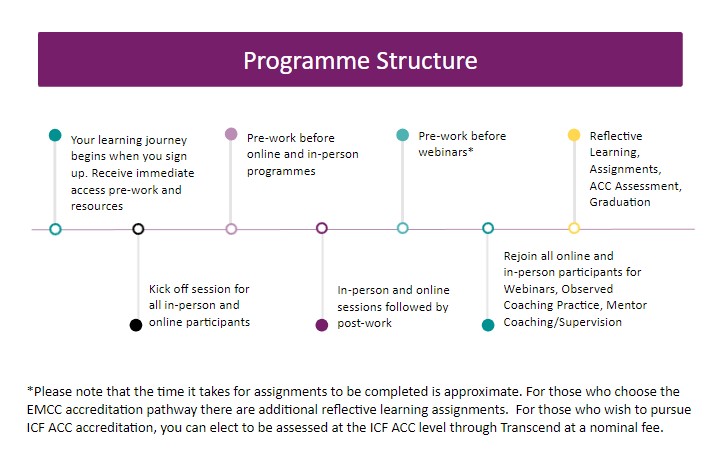Certificate in Professional Coaching Programme – ONLINE September 2023
Kick Off Session : Sept 6, 2023
Online Sessions : Sept 13 – Oct 18, 2023
Webinars, Mentor Coaching, Supervision, and Practice : Oct 25 – Nov 22, 2023
Programme Overview
Our Certificate in Professional Coaching programme is designed to create a strong foundation for building coaching skills and professional coaching practice. Coaches graduate with the confidence, capability and competence to coach at the Associate Certified Coach (ACC) level as defined by the International Coach Federation (ICF) and qualify for the Coach European Individual Award (EIA) at the Foundations or Practitioner level. This program is often chosen by internal or organisational coaches and others wishing to apply the skills of coaching to other domains of their lives. This programme is Part 1 of our ICF Level 2 Accredited programme.

Our Certificate in Professional Coaching and Certificate in Professional Coaching Mastery programmes consist of 4 parts designed to fulfil the accreditation requirements of the ICF and the EMCC.

Once you have successfully completed your coaching programme with us, we (Transcend International) will issue you with the appropriate Certificate. This Certificate can be used to demonstrate to others (such as your peers and prospective clients) that you have successfully completed the requirements to graduate from our programme.
Enroling in the Certificate in Professional Coaching Programme, you may receive one or more of the following Certificates:
- Certificate in Professional Coaching (CPC ICF Level 1)
- Certificate in Professional Coaching (CPC EMCC EQA)
- Certificate in Professional Coaching (CPC ICF Level 1 plus EMCC EQA)
(more information on this in the Guide to Certification and Accreditation section)
| STANDARD | |
| EARLY BIRD (enroll before August 6, 2023) |
Using the LMS
Want to start your learning but don’t know where to start? Below is a short video to guide you with the basics of the LMS.
Questions?
If you have questions or need some help navigating the LMS, send an email to



 Transcend International Holdings Ltd.
Transcend International Holdings Ltd. +852-8191-6819
+852-8191-6819 comms@transcend-intl.com
comms@transcend-intl.com
